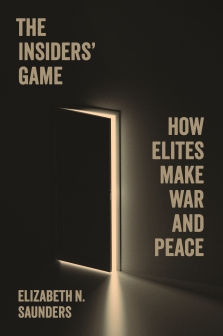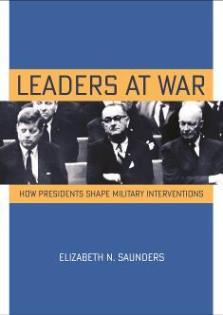Publications
Books:
 The Insiders’ Game: How Elites Make War and Peace
The Insiders’ Game: How Elites Make War and Peace
Forthcoming 2024, Princeton University Press, Princeton Studies in International History and Politics (preorder)
One of the most widely held views of democratic leaders is that they are cautious about using military force because voters can hold them accountable, ultimately making democracies more peaceful. How, then, are leaders able to wage war in the face of popular opposition, or end conflicts when the public still supports them? The Insiders’ Game sheds light on this enduring puzzle, arguing that the primary constraints on decisions about war and peace come from elites, not the public.
An article drawing on part of the book’s argument was published in Security Studies; some of the experimental evidence appears in an article in the Journal of Conflict Resolution.
Leaders at War: How Presidents Shape Military Interventions (Cornell University Press, Cornell Studies in Security Affairs, 2011)
2012 Jervis-Schroeder Best Book Award, APSA International History & Politics Section
Why do some military interventions explicitly try to transform the domestic institutions of the states they target, while others do not, instead attempting only to reverse foreign policies or resolve disputes without trying to reshape the internal landscape of the target state? This book provides a framework for understanding when and why great powers seek to transform foreign institutions and societies through military interventions. In doing so, it highlights a crucial but often-overlooked factor in international relations: the role of individual leaders. The book develops and tests a theory that explains how different leaders shape both the decision to intervene and the choice of intervention strategy, especially the degree to which intervention seeks to interfere in the domestic institutions of target states. Since the role of leaders can be difficult to separate from the influence of international and domestic factors, I test the theory on United States military interventions during the Cold War – a single country within a single international system – using archival and historical sources. Focusing on the administrations of Eisenhower, Kennedy, and Johnson, I examine cases of both intervention and non-intervention. After demonstrating the importance of leaders in this period, I illustrate the theory’s applicability to other historical and contemporary settings, including the early twentieth century, the post-Cold War period, and the Iraq War.
Journal Articles & Book Chapters
“Elites in the Making and Breaking of Foreign Policy”, Annual Review of Political Science 25: 219-240 (2022).
“The Suffragist Peace” (with Joslyn N. Barnhart, Robert F. Trager, and Allan Dafoe), International Organization, 74(4): 633-670 (2020).
- Foreign Affairs online: “Women’s Suffrage and the Democratic Peace: Female Voters Slow the March to War” (with Joslyn N. Barnhart, Robert F. Trager, and Allan Dafoe), August 18, 2020.
“Recapturing Regime Type in International Relations: Leaders, Institutions, and Agency Space” (with Susan D. Hyde), International Organization 74(2): 363-395 (2020).
- New York Times Opinion: “Trump Didn’t Break Our Democracy. But Did He Fatally Weaken It?” (with Susan D. Hyde), Section A, Page 23, December 16, 2020.
“The Domestic Politics of Nuclear Choices — A Review Essay,” International Security 44(2): 146-184 (2019).
- International Security “Off the Page” Podcast (episode 5) on the Iran Nuclear Deal.
“Leaders, Advisers, and the Political Origins of Elite Support for War,” Journal of Conflict Resolution 62(10): 2118-2149 (2018).
- Washington Post Monkey Cage: “Sure, Trump’s advisers aren’t the first to push back against a president. But what’s happening now is completely unprecedented” (September 6, 2018)
“The Ratification Premium: Hawks, Doves, and Arms Control” (with Sarah Kreps and Ken Schultz), World Politics 70(4): 479-514 (2018).
- Washington Post Monkey Cage: “No, Trump can’t count on a hawk’s advantage in making peace with North Korea” with Sarah Kreps and Ken Schultz (May 10, 2018)
“Mapping the Boundaries of Elite Cues: How Elites Shape Mass Opinion Across International Issues” (with Alexandra Guisinger), International Studies Quarterly 61(2): 425-441 (2017). 2015 Best Paper Award, APSA Foreign Policy Section, for paper from 2014 meeting.
“No Substitute for Experience: Presidents, Advisers, and Information in Group Decision-Making,” International Organization 71(S1): S219-S24 (2017).
- Washington Post Monkey Cage: “Mitch McConnell thinks you don’t need experience to be president. Here’s why he’s wrong” (July 27, 2016)
“The Diplomatic Core: The Determinants of High-Level US Diplomatic Visits, 1946-2010” (with James Lebovic), International Studies Quarterly 60(1): 107–123 (2016).
- Foreign Affairs online: “Trump Doesn’t Like Traveling. That’s Bad for Diplomacy” (with James Lebovic), January 20, 2019.
- Washington Post Monkey Cage: “Obama’s symbolic visit to Cuba is the exception. What’s the real history of presidents and international travel?” with James Lebovic (March 23, 2016)
- Political Violence at a Glance blog: “Trump and Diplomacy: Time to Eat Some Spinach,” with James Lebovic (November 28, 2016)
“War and the Inner Circle: Democratic Elites and the Politics of Using Force,” Security Studies 24(3): 466-501 (2015).
“Transparency without Tears: A Pragmatic Approach to Transparent Security Studies Research,” Security Studies 23(4): 689-698 (2014) (contribution to peer-reviewed symposium).
“Good Democratic Leadership in Foreign Affairs: An Elite-Centered Approach,” In Good Democratic Leadership, eds. John Kane and Haig Patapan. Oxford University Press, Forthcoming (2014).
“The Army You Have: The Determinants of Military Mechanization, 1979-2001” (with Todd S. Sechser), International Studies Quarterly 54(2): 481-511 (June 2010).
- Washington Post Monkey Cage: “The new defense budget may change less than you think” with Todd Sechser (February 27, 2014)
“Transformative Choices: Leaders and the Origins of Intervention Strategy,” International Security 34(2): 119-161 (Fall 2009).
“A New Electorate? Comparing Preferences and Partisanship between Immigrants and Natives” (with Rafaela Dancygier), American Journal of Political Science 50(4): 962-981 (October 2006).
“Setting Boundaries: Can International Society Exclude ‘Rogue States’?” International Studies Review 8(1): 23-53 (March 2006).
Work in Progress
“The Leaker’s Gamble: Bureaucrats, Audiences and Policy Shifts” (with Andrew Kydd, formerly titled “Words to the Wise: Bureaucrats, Audiences, and Leaks”)
“Elites, Voters, and Democracies and War” (with Scott Wolford, formerly titled “Intra-Elite Bargains and the Character of Democratic Foreign Policy”)
Selected Analysis/Commentary
“The Unconstrained Presidency: Checks and Balances Eroded Long Before Trump” (with James Goldgeier). Foreign Affairs, September/October 2018, 144-156.
“Good Foreign Policy is Invisible: Why Boring Is Better” (with James Goldgeier), Foreign Affairs Snapshot, February 28, 2017
“How much power will Trump’s foreign policy advisers have? Here’s what the research says” (The Monkey Cage, Washington Post, November 21, 2016)
“What a President Trump means for foreign policy” (The Monkey Cage, Washington Post, November 9, 2016)
“Will foreign policy be a major issue in the 2016 election? Here’s what we know” (The Monkey Cage, Washington Post, January 26, 2016)